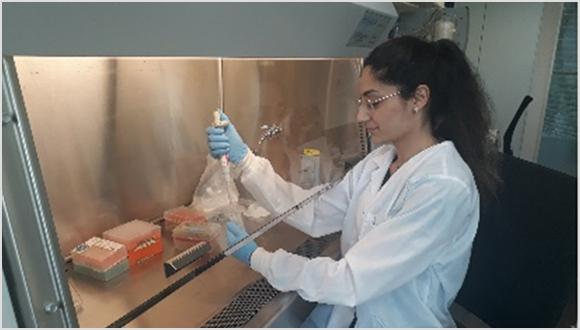דוקטורנטים מספרים - Rima Gnaim
Bioplastic production from bacteria
Rima Gnaim
Supervisor: Prof. Alexander Golberg
Plastic pollution is infiltrating our planet at an alarming rate! We’ve produced more plastic in the last ten years than we did in the entire previous century. We’re throwing millions of tons of plastic waste into our oceans every year, the equivalent of one garbage truck filled with trash being dumped into our oceans every minute. The non-biodegradable nature of petroleum-based plastic, due to its high molecular mass and complex structure, creates a heavy environmental burden as it can remain in water bodies, soil, and landfill for many years. Recent reports have shown that this rate will triple over the next decade. Basically, we will have oceans containing more plastic than fish. Therefore, it is extremely important for us to help save the environment and the marine ecosystem.
I’m Rima Gnaim, a second year PhD student in the direct track at Porter School of Environmental Studies and Earth Sciences, The Faculty of Exact Sciences, Tel Aviv University. It is such a pleasure for me to join the environmental bio-engineering lab under the supervision of Prof. Alex Golberg. He is advising me in the search for a long term solution to this urgent problem, by developing advanced technologies for production of alternative sustainable bio-plastic.
My work is focused on production of Polyhydroxyalkanoats (PHAs) for sustainable bioplastic by bacteria associated with a green macroalgae Ulva sp. PHA polymers are granules produced by microbial metabolism, comprised of a group of natural non-toxic polyesters that are bio-synthesized by an extensive variety of microorganisms under stress conditions with physicochemical properties suitable for a variety of chemical, agricultural, and medical purposes. One of the challenges concerning PHA production is the requirement of cheap, efficient, and accessible organic substitutes and suitable bacteria for the production of large amounts and various types of PHAs. In our recent published work, we examined different macroalgae-derived carbohydrates, as a carbon source for the production of PHAs by Haloferax mediterranei, extreme Halophile archea. We have demonstrated that Ulva sp. is a promising feedstock for PHA production. We now aim to discover efficient bacteria associated with Ulva sp. macroalgae that are able to produce PHA in high productivity with unique polymeric composition. Hopefully, they will possess interesting physicochemical properties to serve as alternatives for petroleum-based plastics.


